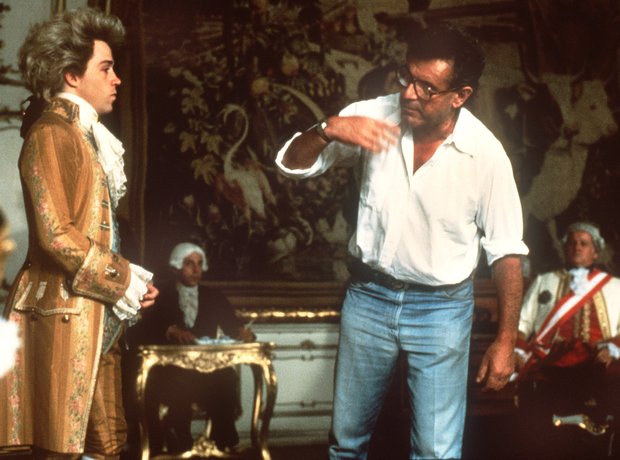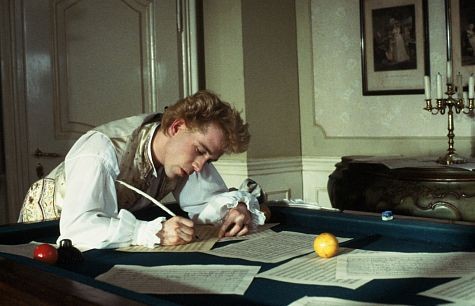 |
| Original Poster |
Directed by Milos Forman
Written by Paul Shaffer
Cinematography by Miroslav Ondricek
Edited by Nena Danevic and Michael Chandler
Music conducted and supervised by Neville Marriner
Starring F. Murray Abraham, Tom Hulce and Elizabeth Berridge
Originally released September 19th, 1984.
I remember being unenthused when my dad first pitched Amadeus to me as an option for an evening movie. I was around 8 or 9, so the prospect of sitting watching a bunch dudes in powdered wigs toss their arms around passionately in front of other dudes in powdered wigs for 3 hours was not particularly appealing. But I abandoned my reservations and my parents and the cats and I gathered around the soft glow of the flat screen to embark on this cinematic expedition. I of course had heard plenty of Mozart in my life. His work is some of most enduring and pervasive in the history of musical composition. But this film, from it's very first frame, invites the viewer to rethink what they originally assumed about the man and the music. It's a grand, sprawling story of love, betrayal, redemption and how to play a piano upside down at a party. It's important to mention that most of the story is fictional. And it's difficult to say with certainty what Mozart and his contemporaries were really like, but the key elements of truth are there. Wolfgang Amadeus Mozart was an artistic visionary who partied mighty hardy and had not a single fuck to give about what the world thought of him. Hell yeah. This film shows us that Mozart, and does it in an exceptional way.
| uoyevolitub! That's Elizabeth Berridge lookin' like a snack. |
| Tom Hulce as Mozart, making a face that sums up this character pretty perfectly. |
I'm a really, really big fan of Mozart (I'm listening to Symphony No. 18 right now!), and while I know it isn't true, I like to believe that he was as hot (and American) as Tom Hulce is playing him. The W.A.M. depicted in this film is irreverent, childish, impossibly outgoing, immature, irresponsible and self-absorbed. He's also one sexy fucking bad boy, baby! Maybe it's Hulce's boyish charm, maybe it's the 80's inspired powdered wigs, maybe it's the image of a man in tights. I don't know. Maybe it's a combination. It's a mystery left for the universe. What I do know is that Hulce delivers one hell of a performance. The Oscar nomination for best actor was well deserved. He strikes just the right tone throughout the film. He fully embraces the outrageous nature of the character publicly, but doesn't deny him the opportunity to be vulnerable in private. He also slays the shift in Mozart's character after the death of his father. For the fist time we see him conducting a performance (specifically Don Giovanni) showing the physical and emotional effort it takes. In most previous performance scenes, he looks like a dog with two very talented tails. We are also treated to the delightful and similarly complex performance that F. Murray Abraham delivers as Antonio Salieri. In a rare occurrence, both Hulce and Abraham were nominated for an Oscar in the same category for the same film. And Abraham won. For good reason. He spends about a third of the film in makeup (which is also exceptional) portraying Salieri as an old man. Seeing his performance jump back and forth through a 30 year period emphasizes his range and dexterity. While the two depictions of the character have the same key features, the perspective of that old Salieri brings to the story he's sharing is beautifully portrayed. It's that gained perspective that makes makes his young self easier to empathize with. Old Salieri is funny, honest and introspective. Young Salieri is a prick, but one we can understand. And that complexity of character would not be possible without an outstanding performance from Abraham. Also a quick shout out to Elizabeth Berridge, who plays Mozart's wife Constanze. As the most consistently tread on victim in this story (one of the only female characters is a victim?!?!?! HowWwwW?), she manages to still appear resilient and self-possessed. Oh fuck! A very young Cynthia Nixon (Miranda on Sex and the City) is also excellent in a bit part. Everyone in this is outstanding and I don't have time to talk about all of them, ok?! Just watch the damn movie.
 |
| Milos Forman (right) showing Tom Hulce (left) how to do The Hustle. |
| F. Murray Abraham (right) and Christine Ebersole (left). |
 |
| This looks cool for sure, but it's a damn inconvenient way to write... |
Amadeus is an exceptionally written serious, fun and meaningful film experience that is amazing to look at. The costumes and set design are perfect. The performances are career defining. And the music is nothing short of magic (obviously). For a story about a bunch of old, white, probably racist, definitely smelly rich dudes, I can not sing it's praises thoroughly enough. If I was to criticize it at all, it's maybe a little too long. But I think any movie that I can't watch without having to make several trips to the bathroom during is too long, so that's not saying much. This is truly one for the god damn books, baby.
Ok, just one more pic:
 |
| Look at that cute baby! He's so good at his job! |
***
Oh my god. I'm so sorry this was so late everyone. Christ. I'm not exaggerating when I say I could write a hundred reviews and never say all I want to about this fucking masterpiece. I honestly didn't realize I'd have so much to agonize over. I chose this one this week because of the directors passing last week. Milos Forman was 89 and had some astounding credits to his name. This was just my favorite of the bunch. If you're going to go watch it for the first time now, or re-watch it for the first time in a long time, keep an eye of Salieri's thing for food and how consistently that's woven into the narrative. It's amazing. Fuck. What a good fucking movie. Please watch it!
That's all for now folks. Until next week. Check out Capella Istropolitana's album 'The Very Best of Mozart'. You won't regret it. Auf Wiedersehen!
No comments:
Post a Comment